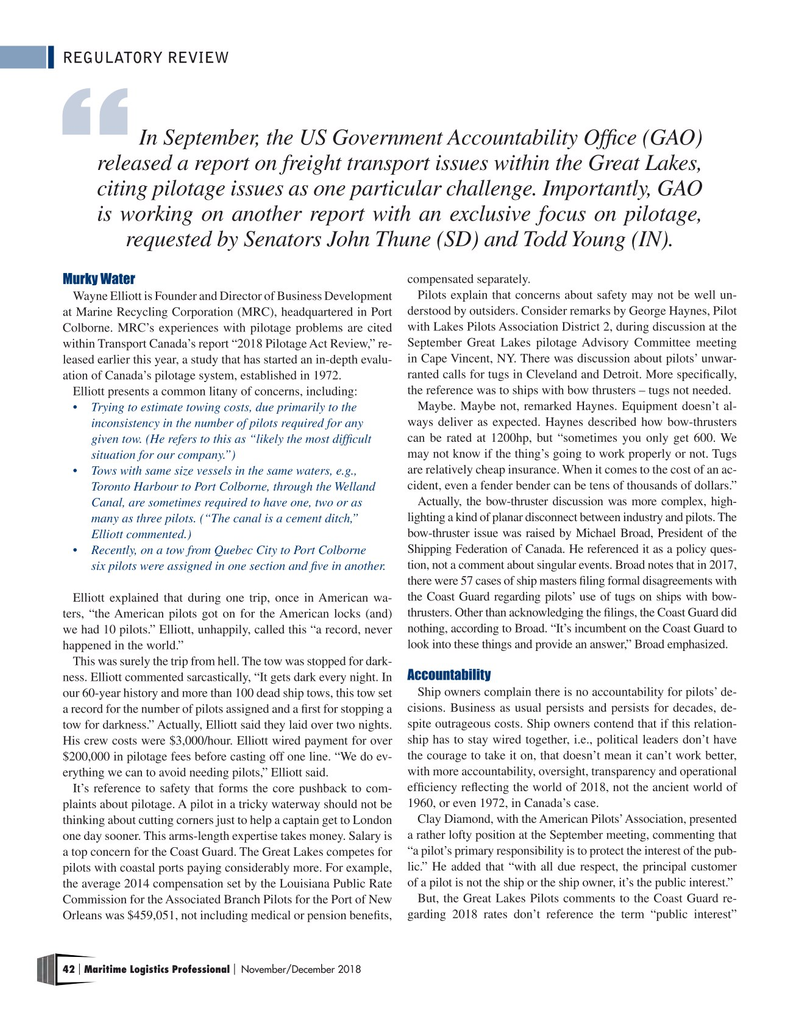
Page 42: of Maritime Logistics Professional Magazine (Nov/Dec 2018)
Regulatory & Environmental Review
Read this page in Pdf, Flash or Html5 edition of Nov/Dec 2018 Maritime Logistics Professional Magazine
REGULATORY REVIEW
In September, the US Government Accountability Offce (GAO) released a report on freight transport issues within the Great Lakes, citing pilotage issues as one particular challenge. Importantly, GAO is working on another report with an exclusive focus on pilotage, requested by Senators John Thune (SD) and Todd Young (IN).
compensated separately.
Murky Water
Wayne Elliott is Founder and Director of Business Development Pilots explain that concerns about safety may not be well un- at Marine Recycling Corporation (MRC), headquartered in Port derstood by outsiders. Consider remarks by George Haynes, Pilot
Colborne. MRC’s experiences with pilotage problems are cited with Lakes Pilots Association District 2, during discussion at the within Transport Canada’s report “2018 Pilotage Act Review,” re- September Great Lakes pilotage Advisory Committee meeting leased earlier this year, a study that has started an in-depth evalu- in Cape Vincent, NY. There was discussion about pilots’ unwar- ation of Canada’s pilotage system, established in 1972. ranted calls for tugs in Cleveland and Detroit. More specifcally,
Elliott presents a common litany of concerns, including: the reference was to ships with bow thrusters – tugs not needed.
• Trying to estimate towing costs, due primarily to the Maybe. Maybe not, remarked Haynes. Equipment doesn’t al- inconsistency in the number of pilots required for any ways deliver as expected. Haynes described how bow-thrusters given tow. (He refers to this as “likely the most diffcult can be rated at 1200hp, but “sometimes you only get 600. We situation for our company.”) may not know if the thing’s going to work properly or not. Tugs • Tows with same size vessels in the same waters, e.g., are relatively cheap insurance. When it comes to the cost of an ac- T oronto Harbour to Port Colborne, through the Welland cident, even a fender bender can be tens of thousands of dollars.” Canal, are sometimes required to have one, two or as Actually, the bow-thruster discussion was more complex, high- many as three pilots. (“The canal is a cement ditch,” lighting a kind of planar disconnect between industry and pilots. The Elliott commented.) bow-thruster issue was raised by Michael Broad, President of the • Recently, on a tow from Quebec City to Port Colborne Shipping Federation of Canada. He referenced it as a policy ques- six pilots were assigned in one section and fve in another. tion, not a comment about singular events. Broad notes that in 2017, there were 57 cases of ship masters fling formal disagreements with
Elliott explained that during one trip, once in American wa- the Coast Guard regarding pilots’ use of tugs on ships with bow- ters, “the American pilots got on for the American locks (and) thrusters. Other than acknowledging the flings, the Coast Guard did we had 10 pilots.” Elliott, unhappily, called this “a record, never nothing, according to Broad. “It’s incumbent on the Coast Guard to happened in the world.” look into these things and provide an answer,” Broad emphasized.
This was surely the trip from hell. The tow was stopped for dark-
Accountability ness. Elliott commented sarcastically, “It gets dark every night. In our 60-year history and more than 100 dead ship tows, this tow set Ship owners complain there is no accountability for pilots’ de- a record for the number of pilots assigned and a frst for stopping a cisions. Business as usual persists and persists for decades, de- tow for darkness.” Actually, Elliott said they laid over two nights. spite outrageous costs. Ship owners contend that if this relation-
His crew costs were $3,000/hour. Elliott wired payment for over ship has to stay wired together, i.e., political leaders don’t have $200,000 in pilotage fees before casting off one line. “We do ev- the courage to take it on, that doesn’t mean it can’t work better, erything we can to avoid needing pilots,” Elliott said. with more accountability, oversight, transparency and operational
It’s reference to safety that forms the core pushback to com- effciency refecting the world of 2018, not the ancient world of plaints about pilotage. A pilot in a tricky waterway should not be 1960, or even 1972, in Canada’s case.
thinking about cutting corners just to help a captain get to London Clay Diamond, with the American Pilots’ Association, presented one day sooner. This arms-length expertise takes money. Salary is a rather lofty position at the September meeting, commenting that a top concern for the Coast Guard. The Great Lakes competes for “a pilot’s primary responsibility is to protect the interest of the pub- pilots with coastal ports paying considerably more. For example, lic.” He added that “with all due respect, the principal customer the average 2014 compensation set by the Louisiana Public Rate of a pilot is not the ship or the ship owner, it’s the public interest.”
Commission for the Associated Branch Pilots for the Port of New But, the Great Lakes Pilots comments to the Coast Guard re-
Orleans was $459,051, not including medical or pension benefts, garding 2018 rates don’t reference the term “public interest” 42 Maritime Logistics Professional November/December 2018 | |

 41
41

 43
43
